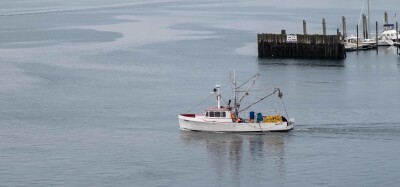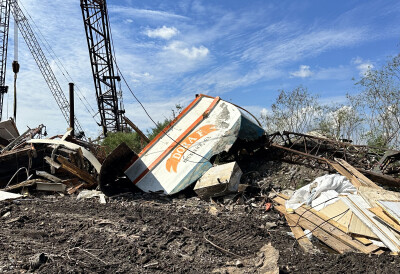Unsettling news out of British Columbia this week comes at the wrong time for Fraser River salmon, but perhaps just the right time for Bristol Bay. This week, the recently beleaguered Fraser River in British Columbia sees the beginning of a projected record run of sockeye salmon. Sadly, Fisheries and Oceans Canada predicts that roughly 1 million to 3 million of those projected 23 million returning fish will have to swim through the toxic runoff of a tailings pond breach from the Mount Polley mine in the next couple of weeks.
This breach also happens to coincide with the opening of public comments on EPA’s latest effort to halt Pebble Mine in the name of clean water before we run the risk of a tailings pond breech in Alaska’s Bristol Bay.
Alaska salmon fisherman Natalia Povelite distributes canned pink salmon in a typhoon-stricken region of the Philippines; Global Food and Nutrition photo.We use our monthly Northern Lights column as a venue to spread the word of what’s happening in Alaska fisheries because Alaska is the source of half of the nation’s wild fish, and the state is often at the forefront of the industry. But being an industry leader is not always about the money you’re hauling in, the efficiencies you’re creating or the strides you’re making in management.
In the case of Bristol Bay, we’ve seen hundreds of small-boat fishermen band together to create a remarkable grassroots campaign that has gone to great lengths to preserve the fishery. For our September issue, Dr. Nina Schlossman writes about a massive donation of canned pink salmon to communities in the Philippines devastated by Super Typhooon Haiyan (or Yolanda). The donation provided nearly a million servings of pink salmon to more than 100,000 people. Read the full story in “Following pinks to the Philippines” on page 6 of our September issue.
To his credit, Alaska Gov. Sean Parnell got the ball rolling on this project and turned to the Alaska Seafood Marketing Institute’s Global Food Aid Program to facilitate the donation. It’s a great example of what fishermen, seafood companies and governments can do to give back. Unfortunately, Parnell does not see eye to eye with fishermen when it comes to protecting the very fisheries that provide jobs in perpetuity — for Alaskans and beyond — and the ability to make these kinds of donations.
Parnell has never been supportive of Bristol Bay fishermen’s drive to protect their watershed — the home of the world’s largest sockeye run — from the threat of Pebble Mine at the federal level. In fact, he recently hired a former Pebble Partnership spokesman as his top fisheries adviser. We may soon have firsthand knowledge of how dangerous the tailings from toxic mine waste can be for a wild sockeye run. Is that likely to encourage the governor to change his tune?







